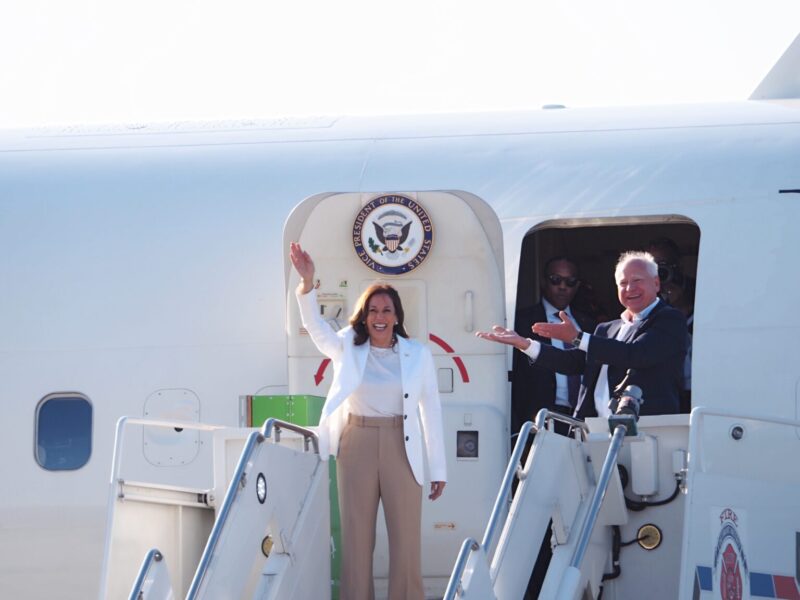A recent Politico Magazine story said Vice President Kamala Harris chose “comfort food” in picking Minnesota Gov. Tim Walz as her running mate in November’s presidential election.
Walz is a white, baldish, plain-speaking “Midwestern dad,” who posts videos offering car-repair tips and jokingly teases his vegetarian daughter that turkey is a vegetable in Minnesota.
A former small-town schoolteacher, military veteran and state-championship-winning high school football coach, Walz is seen as someone who could help Harris win over conservative rural voters in crucial swing states, including Michigan, Pennsylvania and Wisconsin.
Some of his progressive political views probably aren’t held by lots of those likely voters, though.

As Minnesota governor, Walz pushed through a blizzard of legislation that allows undocumented immigrants to obtain driver’s licenses, sets ambitious targets for reducing planet-warming greenhouse gasses and makes Minnesota a sanctuary for those seeking gender-affirming care, among other progressive measures.
Under his watch, Minnesota became the first state to enshrine abortion rights in its constitution following the U.S. Supreme Court’s Dobbs decision.
Republicans aren’t comforted about Harris picking Walz as her running mate. Donald Trump, not one for understatement, said in a fundraising letter that Walz would “unleash HELL ON EARTH” as vice president.
That seems a little far-fetched for a bespectacled, 60-year-old, camo-ballcap-wearing bird hunter.
But here’s something else that should scare Trump as he tries to demagogue his way back to the White House:
Walz is the leader of one of the most economically vibrant states in the country, a record that he and Harris should tout at a time when many voters say pocketbook issues are top of mind in this election cycle.
Here are a few numbers:
- Just 2.9% of Minnesotans looking for a job in June couldn’t find one, among the lowest percentages in the country. Remarkably, the state has posted only one month of double-digit unemployment since 1976. That was in March 2020, the start of the COVID pandemic.
- Minnesota’s per capita income of $71,866 last year was the highest among the Great Lakes states and $3,335 above the national average.
- Although Minnesota residents and businesses pay some of the highest taxes in the country, the state ranks sixth this year in CNBC’s comprehensive report on the best states for business.
Perhaps the most important measure of Minnesota’s vitality comes from the annual Annie E. Casey Foundation Kids Count report, which tracks economic well-being, educational performance, child health and other socio-economic data. Minnesota ranks fifth overall in the country in this year’s study.
Walz can’t take all the credit for his state’s consistently strong economic performance. The foundation for Minnesota’s success as a progressive, welcoming, prosperous state was laid decades ago.
A few years ago, I wrote about the public policy decisions that led Minneapolis and Minnesota to become among the wealthiest and most livable metro areas and states in the county for Ann Arbor-based think tank Michigan Future Inc.
Starting in the 1970s, Minnesota boosted spending on education, began building a transit system, regionalized government in the Twin Cities, took measures to protect the environment and enhance recreation, and crafted a landmark tax-base-sharing program to spread wealth throughout the metro Minneapolis area.
Those moves came as business and political leaders worried that Minnesota was falling behind in incomes, quality of life and talent. Today, Minnesota regularly places high on lists of the most livable states.
Walz has built on Minnesota’s progressive legacy, cutting taxes for families and seniors, but raising them for high-income residents and businesses. He also pushed through major new funding for public transit in the state.
One area where the state has fallen short is in improving economic outcomes for Black residents. Despite its reputation as being welcoming to refugees, immigrants and LGBTQ+ people, Minnesota has long had one of the widest racial wealth gaps in the country and has made little progress in narrowing it.
Median household income for Black families in 2022 was $49,738, 43% below the income of $87,692 for white families.
Racial tensions exploded in Minneapolis after white police officers murdered George Floyd, a Black man who was accused by a store clerk of paying for cigarettes with a counterfeit $20 bill, in 2020. Following his death, large riots broke out, causing hundreds of millions of dollars in damage.
Republicans already are criticizing Walz for what they say was a slow response in quelling the riots, although ABC News obtained a 2020 audiotape in which then-President Trump praised Walz for his actions.
Those attacks against Walz are likely to continue as Trump and his supporters push their law-and-order agenda.
But Walz brings to the Democratic ticket a strong economic record as Minnesota’s governor that can stand up to Trump’s inevitable insults.
And don’t be surprised if the folksy Walz starts serving up some hotdish, the classic tater-tot-layered Minnesota comfort food, on the campaign trail. He even has his own award-winning recipe.
That just might help win over those millions of older, white voters who long for the America of their youth.
Michigan Advance is part of States Newsroom, a nonprofit news network supported by grants and a coalition of donors as a 501c(3) public charity. Michigan Advance maintains editorial independence. Contact Editor Susan J. Demas for questions: [email protected]. Follow Michigan Advance on Facebook and X.






